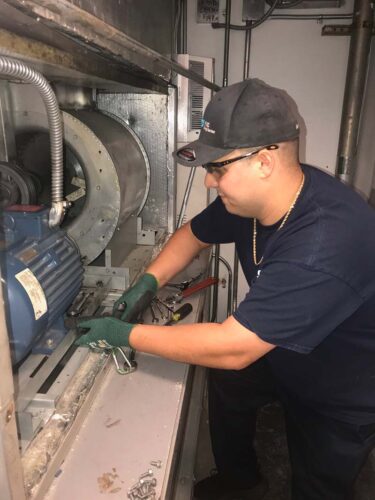No matter your path into the world of HVAC, it’s important to be prepared for the road ahead. While demand for HVAC technicians is constantly growing, it’s imperative to understand the conditions you will be faced with — on top of knowing the tricks of the trade. So if you’re an aspiring HVAC technician, here’s what you need to know before training for your new career.
What to Do Before HVAC Technician Training
As is with any career, before diving into the world of HVAC technician training, you’ll need to complete a checklist of items before moving further in the industry. Here’s what you’ll need to do…
Get Your High School Diploma or GED
For those applying for HVAC technician training in the state of New York, you’ll need to have received your high school diploma or GED equivalent. It’s important that you get your high school diploma or GED because it shows that you have demonstrated the aptitude to pursue the field of HVAC. Moreover, showing interest and excelling in the fields of mathematics and science will take you a long way in HVAC.
Apply to a Training Program
After you’ve decided that you want to pursue an HVAC technician career, it’s time to start looking for a training program. There are many different options available, so it may be difficult to choose between them. When choosing a training program, there are some important things that you should consider:
- What kind of work experience will they provide?
- What kind of hands-on training is provided?
- How many apprentices will you be working alongside?
Donnelly Mechanical receives a lot of students from the Refrigeration Institute and the Union (Local 638). There, apprentices will receive hands-on training and experience with day-to-day HVAC operations. On top of that, safety is heavily emphasized.
Steve Cuadra of Local 638 states that in working in New York City’s five boroughs, one must obtain a site safety training card. This is earned through 30 hours of OSHA training, on top of 10 hours of extra training in fall prevention and drug/alcohol awareness — thus totaling 40 hours.
Understanding Safe Working Practices

HVAC technician training is not an easy task for most. Applying to a training program as those mentioned prior will expose apprentices to real-world applications and highlight the strenuous nature of the job.
The Physical Demands of HVAC
Steve Cuadra of Local 638 notes that all applicants must have a high school diploma and pass a pre-employment drug test. In discussing the dangers of HVAC work, Cuadra also noted the physical demands, which potential technicians should be aware of. These include:
- Fear of heights/working on ladders
- Working in frigid temperatures during the winter months
- Working in boiler rooms during the summer months
Proper PPE Use
Knowing how to use Personal Protective Equipment (PPE) is of utmost importance when it comes to HVAC technician training. This includes:
- hard hats
- gloves
- respirator
- steel-toed shoes or boots
- safety glasses/goggles or face shields in some cases (especially if you’re working with combustible materials)
- hearing protection when needed (when working with loud machines such as compressors)
The best way to protect yourself from injury is by using proper equipment designed for specific tasks rather than trying something on a whim that may not be suited for what you need it for. Furthermore, make sure that this equipment has been inspected recently by someone qualified enough before using it! Making sure that your equipment has not been tampered with or jeopardized by on-site mishaps will prevent further injury.
In addition to wearing gloves when handling chemicals and oils, use a respirator when working with any toxic materials or fumes that may cause irritation or illness. When operating heavy machinery such as floor sanders and electric chainsaws, make sure you wear protective eyewear at all times. It’s also good practice to wear steel-toed shoes whenever possible because they offer superior foot protection in case of accidents involving tools or other sharp objects (which are common in this line of work).
HVAC Technician Training on the Job (w/ Technicians and Supervisors)
Lastly, throughout your time in an apprenticeship program, you will experience practical hands-on training with technicians and supervisors.
As a young apprentice, experienced HVAC technicians and supervisors will be there to guide you throughout the day-to-day processes. It’s important for young apprentices to ask questions and pick the brains of those who have been in the field for years prior. That way, not only will you be able to apply the technical knowledge learned in the classroom, but you’ll also be equipped with the practical tools that’ll make your day-to-day workflow easier in the years to come!
HVAC Technician Training with Donnelly Mechanical
At Donnelly Mechanical, we are home to some of the most experienced and well-trained HVAC technicians in the industry. However, these experienced and trained techs were once just like you — a burgeoning apprentice with a knack for HVAC.
If you are interested in making the jump from your training into an exceptional workforce at Donnelly Mechanical, please visit our website and get in touch with us today!